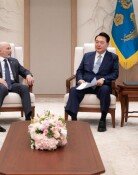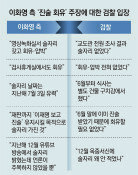Washington officials commend interns from Korea
Washington officials commend interns from Korea
Posted September. 02, 2013 03:40,
This reporter first met with a Korean intern in Washington on December 19, 2012, or the fifth day after I arrived in the U.S. capital. When I visited the office of futurist Dr. Jerome Glenn in central Washington to write the first article for New Years special reporting series, I was welcomingly received by Yeon So-yoon, 22, a student of economics major from Hanyang University in Seoul, at the entrance.
Working as a member of the Ninth Group of WEST, an internship program for Korean college students run in the U.S., from April 2012, Yeon was working at the Millennium Project, a think tank operated by Dr. Glenn. Afterwards Yeon took a second internship at the Korean Embassy in Washington, and returned to Korea last month. She said, I was able to have better understanding about the U.S. as a country and the world of professionals.
Apart from the WEST Program run jointly by the Korean and the U.S. governments, the Asan Seowon, established by the Asan Institute for Policy Studies and the Asan Nanum Foundation, has also sent nearly 100 Korean college students to Washington through the three events already this year.
Kang Wan-seop, 26, an economics major at Sogang University who had worked at the Center for Strategic and International Studies in Washington as a member of the First Group of the Asan Seowon program, sent an essay via email after returning to Korea in April this year, saying, Washington is truly a land of opportunities, and is a place where you can forge a wonderful network with great people. When he went to a church on Easter, he had an honor of shaking hands with President Barack Obama and his wife.
All the American societal leaders who formed relationships with the interns from Korea have said they have good impressions of young Koreans. WEST Program Director Jim Kelman said Korean college students seem to be striving to find opportunities through which they can learn technology and knowledge needed for a better future. Sean Seiler, program officer at the Asan Institute for Policy Studies, said, After carrying out their challenging tasks during the day, they explore the city, and make efforts to find new friends.
WEST is an effective way to bring the two countries closer, said Paul Thomas in charge of the West Program at the U.S. Embassy in Seoul in a written interview with The Dong-A Ilbo in May. Young college students who participate in the program will become Korea`s future leaders who have deep understanding of the U.S.
This reporter also shared his view, whenever meeting with young Koreans who are familiarizing themselves to living in the U.S. My sense of envy that If I had a similar experience as these young Koreans, how broader view and understanding would I have had in my life led to have the conviction that Exchange between young people is sure to generate human resources who will extend and broaden the Korea-U.S. alliance that marks the 60th anniversary this year to a new 60 years.
In this context, it was great that President Park Geun-hye and President Obama agreed to extend the WEST internship program by another five years during their summit in May. It is also commendable that Asan Seowon decided to extend the duration of its interns stay in the U.S. from three months to four months beginning next year. It is also sincerely hoped that the five-year grand plan Thomas informed Dong-A will be achieved without fail.
The biggest goal of the West Program over the next five years is to send Americans to Korea. In other words, I hope to see Americans learn Korean for four to five months, and work as an intern at a Korean institution for up to one year, traveling around the country. Americans better understanding of Korean culture, society and business environment will serve interests of the two countries.







